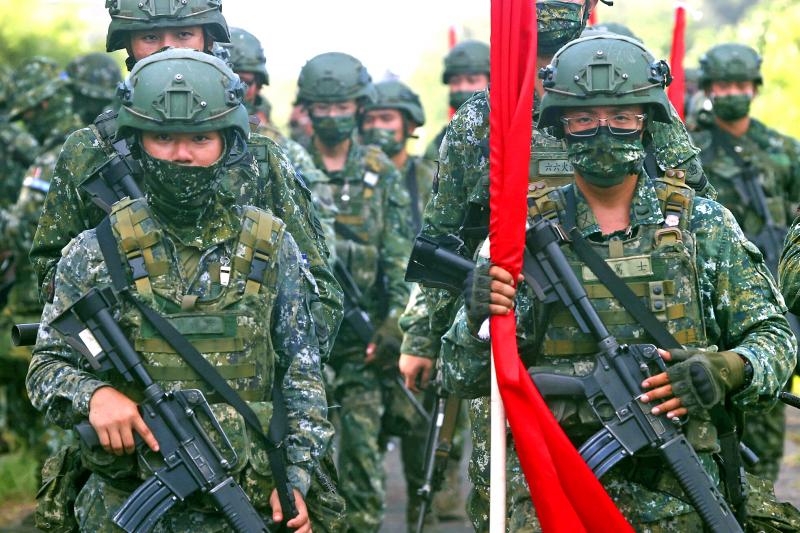Lawmakers are calling for reservist standards to be relaxed to boost their numbers, as well as for improved combat training.
Democratic Progressive Party (DPP) Legislator Wang Ting-yu (王定宇) on Friday said that Taiwan should take lessons Ukraine’s preparedness for invasion.
Kyiv mobilized its reservists at the last minute, demonstrating a lack of systems in place to assemble them in time, Wang said, adding that simply handing out weapons to citizens does not make them adequate as troops.

Photo: Reuters
The majority of Taiwan’s 2.5 million reservists lack training, and the government should improve reservist instruction, he said.
The military’s first-wave reservists, numbered at 300,000, should be fully trained and on standby at all times, he said.
First-wave reservists are those expected to join the standing military force when an enemy launches a first strike against Taiwan.
A nation must have enough reservists to call on if total mobilization is required, DPP Legislator Tsai Shih-ying (蔡適應) said.
He also called for reservist training on a regular rotation and said that the military should consider expanding the reservist pool.
Institute for National Defense and Security Research senior analyst Su Tzu-yun (蘇紫雲) said Taiwan’s current “combat reservists” system only accepts those who retired after volunteering to serve in the military.
Relaxing standards would allow those who previously underwent mandatory service to join, he said, adding that the government should reinstate mandatory service of nine months to one year.
If this proves difficult, four months of service would suffice, provided there is regular recall training, he said.

The Grand Hotel Taipei on Saturday confirmed that its information system had been illegally accessed and expressed its deepest apologies for the concern it has caused its customers, adding that the issue is being investigated by the Ministry of Justice Investigation Bureau. The hotel said that on Tuesday last week, it had discovered an external illegal intrusion into its information system. An initial digital forensic investigation confirmed that parts of the system had been accessed, it said, adding that the possibility that some customer data were stolen and leaked could not be ruled out. The actual scope and content of the affected data

DO THEY BITE IT? Cats have better memories than people might think, but their motivation is based entirely around the chance of getting fed Cats can remember the identity of the people who fed them the day before, Taipei-based veterinarians said on Friday, debunking a popular myth that cats have a short memory. If a stray does not recognize the person who fed them the previous day, it is likely because they are not carrying food and the cat has no reason to recognize them, said Wu Chou Animal Hospital head Chen Chen-huan (陳震寰). “When cats come to a human bearing food, it is coming for the food, not the person,” he said. “The food is the key.” Since the cat’s attention is on the food, it

‘LIKE-MINDED PARTNER’: Tako van Popta said it would be inappropriate to delay signing the deal with Taiwan because of China, adding he would promote the issue Canadian senators have stressed Taiwan’s importance for international trade and expressed enthusiasm for ensuring the Taiwan-Canada trade cooperation framework agreement is implemented this year. Representative to Canada Harry Tseng (曾厚仁) in an interview with the Central News Agency (CNA) said he was increasingly uneasy about Ottawa’s delays in signing the agreement, especially as Ottawa has warmed toward Beijing. There are “no negotiations left. Not only [is it] initialed, we have three versions of the text ready: English, French and Mandarin,” Tseng said. “That tells you how close we are to the final signature.” Tseng said that he hoped Canadian Prime Minister Mark Carney

President William Lai (賴清德) yesterday bestowed one of Taiwan’s highest honors on Saint Vincent and the Grenadines (SVG) Ambassador Andrea Clare Bowman in recognition of her contributions to bilateral ties. “By conferring the Order of Brilliant Star with Grand Cordon on Ambassador Bowman today, I want to sincerely thank her, on behalf of the Taiwanese people, for her outstanding contribution to deepening diplomatic ties between Taiwan and SVG,” Lai said at a ceremony held at the Presidential Office in Taipei. He noted that Bowman became SVG’s first ambassador to Taiwan in 2019 and